Related Research Articles

Labelle was an American funk rock band that originated out of the Blue Belles, a girl group who were a popular vocal group of the 1960s and 1970s. The original group was formed after the disbanding of two rival girl groups in the area around Philadelphia, in Pennsylvania, and Trenton, in New Jersey: the Ordettes and the Del-Capris, forming as a new version of the former group, then later changing their name to the Blue Belles. The founding members were Patti LaBelle, Cindy Birdsong, Nona Hendryx, and Sarah Dash.
The Action were an English band of the 1960s, formed as the Boys in August 1963, in Kentish Town, North West London. They were part of the mod subculture, and played soul music-influenced pop music.

Patricia Louise Holt, known professionally as Patti LaBelle, is an American R&B singer and actress. She has been referred to as the "Godmother of Soul".

Laura Nyro was an American songwriter and singer. She achieved critical acclaim with her own recordings, particularly the albums Eli and the Thirteenth Confession (1968) and New York Tendaberry (1969), and had commercial success with artists such as Barbra Streisand and the 5th Dimension recording her songs. Wider recognition for her artistry was posthumous, while her contemporaries such as Elton John idolized her. She was praised for her emotive three-octave mezzo-soprano voice.

The Four Lads were a Canadian male singing quartet that earned many gold singles and albums in the 1950s, 1960s, and 1970s. Their million-selling signature tunes include "Moments to Remember"; "Standing on the Corner"; "No, Not Much"; "Who Needs You?" and "Istanbul".
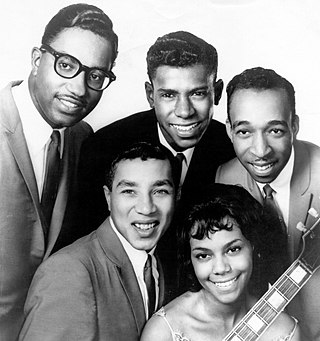
The Miracles were an American vocal group that was the first successful recording act for Berry Gordy's Motown Records, and one of the most important and most influential groups in the history of pop, soul, R&B and rock and roll music. The group's international fame in the 1960s, alongside other Motown acts, led to a greater acceptance of Rhythm & Blues and pop music in the U.S., with the group being considered influential and important in the development of modern popular music.
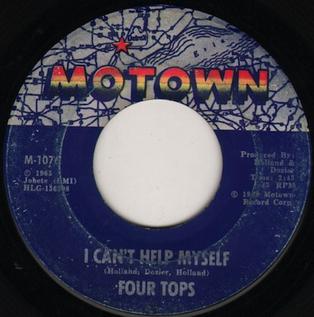
"I Can't Help Myself" is a 1965 song recorded by the Four Tops for the Motown label.

"Nowhere to Run" is a 1965 song by Martha and the Vandellas for the Gordy (Motown) label and is one of the group's signature songs. The song, written and produced by Motown's main production team of Holland–Dozier–Holland, depicts the story of a woman trapped in a bad relationship with a man she cannot help but love.

Gonna Take a Miracle is the fifth album by New York City-born singer, songwriter and pianist Laura Nyro, with assistance by vocal trio Labelle. It was released on Columbia Records in November 1971, one year after its predecessor Christmas and the Beads of Sweat. The album is Nyro's only all-covers album, and she interprets mainly 1950s and 1960s soul and R&B standards, using Labelle as a traditional back-up vocal group.
The Miracles were the Motown Record Corporation's first group and its first million-selling recording artists. During their nineteen-year run on the American music charts, the Miracles charted over fifty hits and recorded in the genres of doo wop, soul, disco, and R&B. Twenty-six Miracles songs reached the top 10 of the Billboard R&B singles chart, including four R&B number ones. Sixteen charted within the top 20 of the Billboard Hot 100, with seven reaching the top ten and two – 1970's "The Tears of a Clown" and 1975's "Love Machine" – reaching #1. A third song, the million-selling "Shop Around", reached #1 on the Cash Box magazine pop chart. The Miracles also scored 11 U.S. R&B top 10 albums, including 2-#1's.

The Miracles Doin' Mickey's Monkey is an album by The Miracles, released in 1963 by Tamla Records. It includes the group's Top 10 smash single "Mickey's Monkey", written and produced by Holland-Dozier-Holland, which was later recorded by several other artists. "Mickey's Monkey" popularized "The Monkey" as a novelty dance. Also included is another H-D-H dance-oriented single, "I Gotta Dance to Keep From Crying", a Billboard Top 40 hit. The album peaked at No. 113 on the Billboard 200.
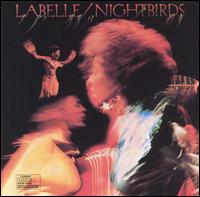
Nightbirds is an album by the all-female singing group Labelle, released in 1974 on the Epic label. The album features the group's biggest hit, the song "Lady Marmalade," and it became their most successful album to date.
"The Bells" is a 1970 single recorded by The Originals for Motown's Soul label, produced by Marvin Gaye and co-written by Gaye, his wife Anna Gordy Gaye, Iris Gordy, and Elgie Stover.

Alessandro Carmelo "Teddy" Randazzo was an American pop songwriter, singer, arranger and producer, who composed hit songs such as "Goin' Out of My Head", "It's Gonna Take a Miracle", "Pretty Blue Eyes", and "Hurt So Bad" in the 1960s.
"I Gotta Dance to Keep from Crying" is a 1963 hit by the Miracles on Motown's Tamla label. It was written and produced by Motown's main songwriting team, Brian Holland, Lamont Dozier, and Eddie Holland.
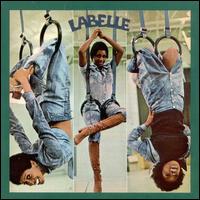
Labelle is the debut album of American singing trio Labelle, formerly a four-girl group known as Patti LaBelle & The Bluebelles. This was Labelle's first release for Warner Bros. Records.
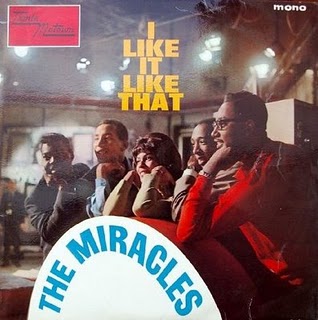
I Like It Like That is an album by Motown group the Miracles, compiled for the UK market and released on the UK Tamla-Motown label as one of its initial group of six albums in March 1965. There was no equivalent album to this in the USA. It is known as the Miracles' "forgotten album".

American R&B singer Patti LaBelle has released eighteen studio albums, three live albums, fourteen compilation albums, and forty-seven singles. To date, LaBelle has sold 50 million records worldwide. According to RIAA, she has attained six gold and one platinum album in the United States. LaBelle has also charted forty-two hits on Billboard's Hot/R&B Hip-Hop Songs, 13 of which reached the Top 10.
"Come On Do the Jerk" was a 1964 song recorded by R&B group the Miracles on Motown Records' Tamla label subsidiary. It was co-written by Miracles members Pete Moore, Bobby Rogers and Smokey Robinson and drummer Donald Whited. A single-only release, it did not appear on any original Miracles studio album, and was the group's last single release of 1964. Robinson and fellow Miracle Bobby Rogers were the song's producers. The flip side, "Baby Don't You Go", was also a popular regional hit but was not released on CD until The 35th Anniversary Collection in 1994. Both sides of this single received new stereo mixes for the 2002 compilation Ooo Baby Baby: The Anthology.
"The Wah-Watusi" is a song written by Kal Mann and Dave Appell and performed by The Orlons. It reached No.2 on the U.S. pop chart behind Bobby Vinton's "Roses Are Red ", No.5 on the U.S. R&B chart, and No. 12 in Canada in 1962. It was featured on their 1962 album The Wah-Watusi.
References
- ↑ "Major Lance, "The Monkey Time" Chart Positions" . Retrieved March 10, 2019.
- ↑ "CHUM Hit Parade - September 9, 1963".
- ↑ "Major Lance, The Monkey Time". Discogs . 1963. Retrieved March 10, 2019.
- ↑ "Major Lance, "The Monkey Time" Single Release" . Retrieved March 10, 2019.
- ↑ "Top Records of 1963", Billboard , Section II, December 28, 1963. p. 30. Retrieved March 10, 2019.
- ↑ Kowal, Barry. Billboard Magazine's (USA) Top 100 Single Recordings of 1963, Hits of All Decades. August 27, 2017. Retrieved March 10, 2019.
- ↑ "The Tubes, "The Monkey Time" Chart Positions" . Retrieved March 10, 2019.
- ↑ "The Miracles, The Miracles Doin' Mickey's Monkey". Discogs . 11 November 1963. Retrieved March 10, 2019.
- ↑ "Georgie Fame, Fame at Last". Discogs . 1964. Retrieved March 10, 2019.
- ↑ "Gene Barge, Dance with Daddy "G"". Discogs . 1965. Retrieved March 10, 2019.
- ↑ "The Mad Lads, The Mad, Mad, Mad, Mad, Mad Lads". Discogs . 1969. Retrieved March 10, 2019.
- ↑ "Laura Nyro and Labelle, Gonna Take a Miracle". Discogs . 17 November 1971. Retrieved March 10, 2019.
- ↑ "Al Kooper, A Possible Projection of the Future / Childhood's End". Discogs . 1972. Retrieved March 10, 2019.
- ↑ "Johnny Rivers, Outside Help". Discogs . 1977. Retrieved March 10, 2019.
- ↑ "Jimmy Burns, Night Time Again". Discogs . 1999. Retrieved March 10, 2019.
- ↑ "The Action, Uptight and Outasight". Discogs . Retrieved March 10, 2019.
- ↑ "The Velvelettes, The Velvelettes: The Motown Anthology". Discogs . 31 October 2004. Retrieved March 10, 2019.